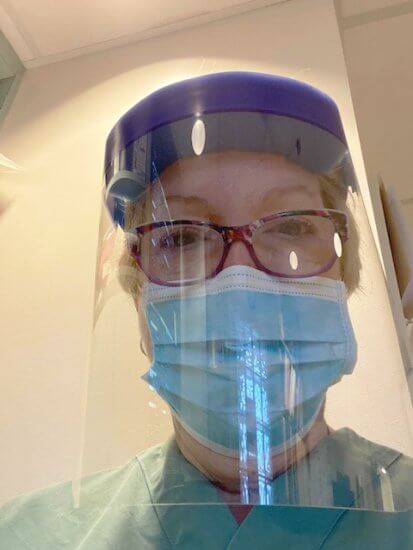Debbie Fraser: Working front lines in the NICU during COVID-19
Working the front lines in a Neonatal Intensive Care Unit (NICU) is no easy task, especially when a global pandemic emerges and most processes and procedures change to ensure the health and safety of newborn babies and their families.
Debbie Fraser knows this first-hand. In addition to supporting her Athabasca University (AU) students, the Faculty of Health Disciplines faculty member is also a Nurse Practitioner (NP) in the NICU at St. Boniface Hospital in Winnipeg, Man.
Fraser started as a sessional instructor with AU in 2005 and began her full-time faculty position in 2008. She was the Program Director of the Master of Nursing: NP program for the past 10 years until going on sabbatical in September 2019.
“Nurse Practitioners are required to do clinical practice to maintain our NP licence. My practice area is the NICU,” she said.

With all the recent changes, Fraser said she and her colleagues are trying hard to help parents celebrate birth and get through a stressful time in the absence of their normal supports.
“Unfortunately, a lot has changed in the last few months. We practice family-centred care and involve all members of our team, including parents in planning care. Now we do our daily rounds away from the bedside with only a few team members. Nurses and parents no longer join us for rounds. We now only allow one parent to visit at a time and no other support people or family to visit,” Fraser said.
As the processes change to ensure public safety, health-care workers must also wear Personal Protective Equipment (PPE) to protect themselves and their patients. Fraser said this presents a challenge when working with tiny newborns.
“We now wear masks and face shields all day long. It’s hard to see through the shield when performing procedures on babies a little bigger than a pound of butter. Not only is it hot, hard to breathe, hard to hear and hard on the eyes and ears, but sadly it is very hard to sit with a crying mom and have her only be able to see the empathy and support in my eyes from behind a piece of plastic,” she said.
Fraser mentioned they are fortunate that in her NICU, they see few suspected COVID-19 infections and she and her colleagues feel fairly safe coming to work. She added that despite the difficult parts of the profession, there are very happy ones, too.
“We now wear masks and face shields all day long. Its hard to see through the shield when performing procedures on babies a little bigger than a pound of butter. Not only is it hot, hard to breathe, hard to hear and hard on the eyes and ears, but sadly it is very hard to sit with a crying mom and have her only be able to see the empathy and support in my eyes from behind a piece of plastic.”
– Debbie Fraser, AU faculty member and NP in the NICU at St. Boniface Hospital
“Our babies stay with us anywhere from a few hours to up to six months. Over time we become quite close to our families and celebrate many milestones with them along the way,” she said. “We have a parent support group and a parent Facebook group where parents and staff cheer for graduations and enjoy post-graduation photos and updates.
“I have worked in NICU for all of my 39 years as a nurse and can’t think of a better place to be,” concluded Fraser.
To learn more about the Master of Nursing: Nurse Practitioner program at Athabasca University, visit the program webpage.